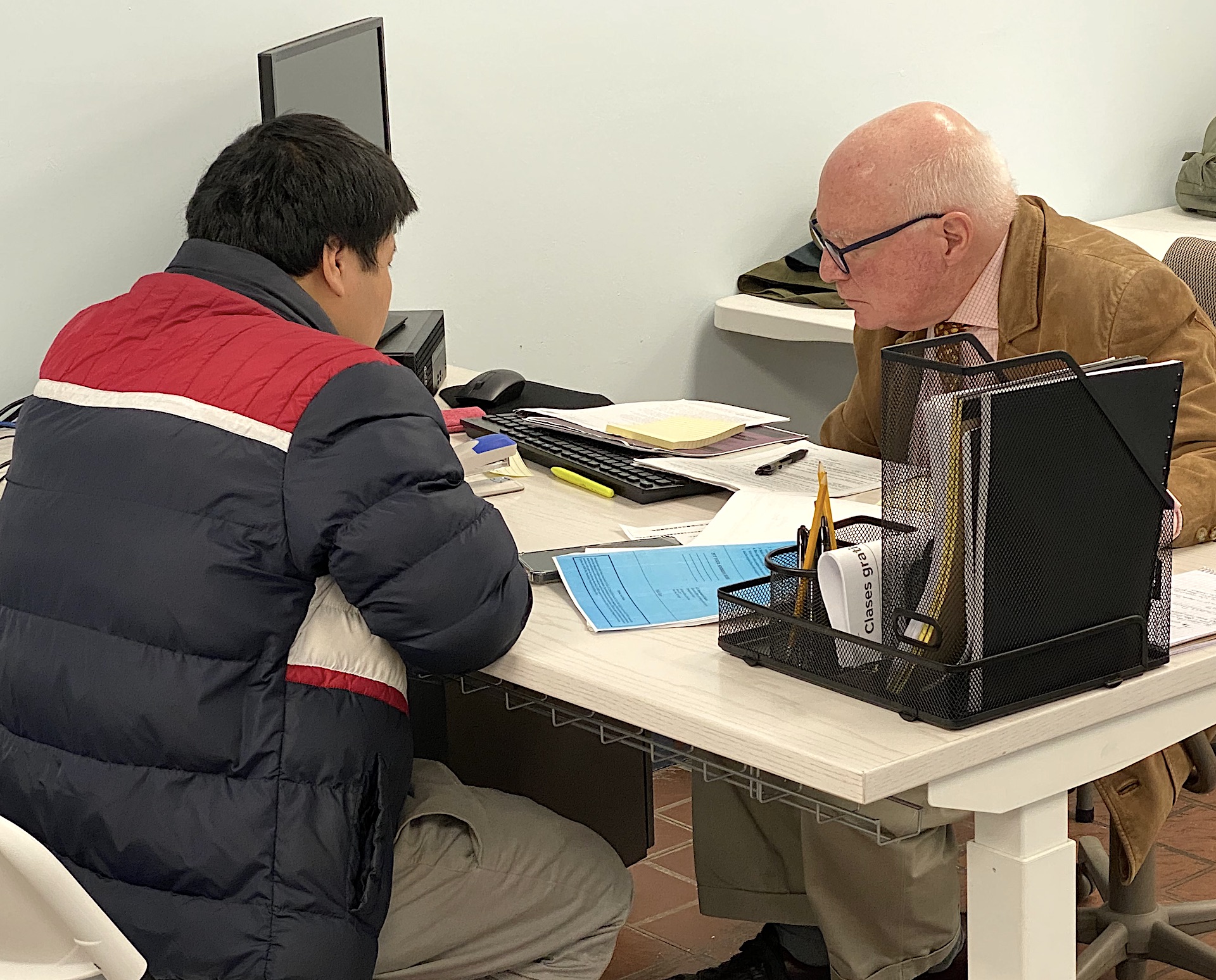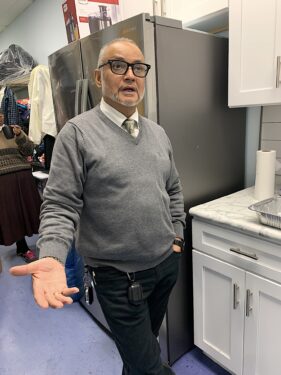
BROOKLYN HEIGHTS — Deacon Manuel Quintana and a young man from China lean over a speaker phone to communicate with an interpreter who is facilitating their conversation from English to Mandarin, back to English, and Mandarin again.
Gradually, the trio unravels the young man’s immigration issues, and solutions emerge.
But the process is often long for this man and the throngs of immigrants who come to this service center in the Bishop Nicholas DiMarzio Residence in Brooklyn Heights.
Catholic Charities Brooklyn & Queens (CCBQ) provides this office at the DiMarzio residence (the former Pierrepont Hotel) to help newcomers find assistance navigating the U.S. immigration system, obtain work permits, and apply for political asylum.
Deacon Quintana noted there has been a switch in the demographics of those seeking help. “It had been primarily a Central American group, all speaking Spanish,” he said. “But in the middle of the summer, there started to become more people from Africa.”
Deacon Danny Rodriguez, another volunteer at the CCBQ center, said he has helped migrants from Guinea, Nigeria, and Senegal and Mauritania, as well as the people from Central America who keep coming.
“It has gotten even more interesting and more intense,” he said. “Since 8 o’clock this morning, I must have seen about 40-45 [people]. Today we have two people from China.”
The deacons are too busy to delve into why the people are coming.
Still, a “perfect storm” is raging with political and economic turmoil in countries of origin and ineffective U.S. border policies that have gone unresolved during the administrations of presidents from both major political parties.
In summer 2022, thousands of immigrants from Central America started arriving by bus to New York City from the border with Mexico.
The need for intake services ballooned. Immigration officials at the border told the newcomers to contact Catholic Charities once their buses reached New York City.
CCBQ responded, even though the staff had no advance warning that immigrants would be lining up around the block outside the headquarters at 191 Joralemon St.
There, a conference room was devoted to helping people find services to seek and obtain asylum, housing, winter clothing, and medical care.
But the need outgrew the conference room, so the operation was moved in September a few blocks away to the Bishop DiMarzio Residence.
“I’m sure it will continue to change,” Deacon Quintana said. “There’s no question about it.”

Since July 2022, CCBQ has served about 11,300 asylum-seekers, officials for the agency said.
In addition, CCBQ helps newcomers by sponsoring outreach services, like job training and soup kitchens at several parishes.
They are St. Michael in Sunset Park, St. Michael-St. Malachy in East New York, St. Gabriel in Cypress Hills, Our Lady of Sorrows in Corona, and Presentation of the Blessed Virgin Mary and St. Pius V, both in Jamaica, the officials said
The agency also distributes emergency food bags from the headquarters on Joralemon Street.
For all of these services, CCBQ relies on a host of bilingual volunteers, including religious sisters, but not just for Spanish speakers. Deacon Ronald Agnant, who speaks Creole, does the same work as the other deacons, helping immigrants from Caribbean nations at the service center.
The Tablet met with Deacons Quintana and Rodriguez on Dec. 7, just a day after 12,000 migrant crossings occurred at the border — a new record for a single day, according to the New York Post.
Deacon Quintana is part of the pastoral staff at the Co-Cathedral of St. Joseph and St. Teresa of Avila Parish in Prospect Heights. He’s also a retired lawyer.
Immigration law was not his field, but he has served on the board for Catholic Migration Services, including a few years as chair. The experience gave him some insight into the complexities of immigration law.
When CCBQ needed volunteers, he responded. And like Deacon Rodriguez, he has learned to quickly overcome language barriers with on-call interpreters or voice-activated translation software.
Both deacons said every person’s story is different, but also the same.
But the newly arrived Africans have endured other turmoil. The volunteers have helped former slaves from Mauritania. There, slavery is illegal, but it’s still deeply entrenched in the culture, so it fuels the economy unchecked.
“The people are unbelievably inspiring,” Deacon Quintana said. “They come the way our own ancestors came — to find freedoms that they didn’t have and to build better lives, and in order to contribute.”
Deacon Rodriguez is a retired network engineer who worked 22 years for Verizon.
He assists the pastoral efforts at St. Catharine of Alexandria, Borough Park, plus the Basilica of Our Lady of Perpetual Help and St. Agatha parishes, both in Sunset Park.
Deacon Rodriguez also volunteers at cemeteries operated by the Diocese of Brooklyn.
He said most of the newcomers have heard very few kind words from anyone, having endured hardships in their homelands, on their journeys, and at the border.
The deacons try to change that.
“We try to give them kind, reassuring words, and words of truth,” Deacon Rodriguez said. “A lot of them get put on the bus and told, ‘Oh, you’re going to get immediate work and an apartment.’ but that’s not true.”
Applying for asylum and obtaining a work permit can take at least five months.
“So,” Deacon Rodriguez said, “it’s our job to tell them the truth, to show them the correct process.”

How To Get Help
Asylum-seekers who need help navigating the U.S. immigration system can go to the Brooklyn and Queens Migrant Assistance and Satellite Centers at these locations:
CCBQ headquarters
191 Joralemon Street, Brooklyn, NY 11201
Tuesday and Wednesday: 10 AM — 12 PM
St. Pius V Church
106-12 Liverpool Street, Jamaica, NY 11435
Monday, Wednesday and Thursday: 10 AM — 12 PM
Or call CCBQ at 718-722-6001.
